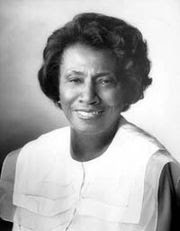 This week we remember the life and music of American composer and educator Undine Smith Moore (1904-1989). Born in Jarratt, Virginia the granddaughter of slaves, she began to study piano at age seven. After attending Fisk University she attended Juilliard on scholarship. Her first career was in music education, as supervisor of music for the Goldsboro, North Carolina school system. She went on to receive a Master of Arts in Teaching from Columbia University. Smith Moore became a faculty member of Virginia State University in 1927 and remained on staff until 1972.
This week we remember the life and music of American composer and educator Undine Smith Moore (1904-1989). Born in Jarratt, Virginia the granddaughter of slaves, she began to study piano at age seven. After attending Fisk University she attended Juilliard on scholarship. Her first career was in music education, as supervisor of music for the Goldsboro, North Carolina school system. She went on to receive a Master of Arts in Teaching from Columbia University. Smith Moore became a faculty member of Virginia State University in 1927 and remained on staff until 1972.
Over her lifetime she wrote over 100 compositions, though only 26 were published during her lifetime. Known as the “Dean of Black Women Composers”, her compositions include a range of genres – from piano, chamber ensembles, and choral works. She is largely remembered for her spirituals.
Smith Moore was honored at the First National Congress on Women in Music in 1981. Her keynote address was printed in the International Alliance for Women in Music Journal, and is available online in full. In it she discusses her upbringing, education, and the opportunities and challenges she has experienced throughout her career – as well as her insights on the future of music. Her words continue to be relevant and powerful:
I was asked to comment on the role and the position of the Black artist. I would speak firstly of position, and this is not related just to Blacks, it’s everybody:
The artist is not highly valued in American society. And from what I read in the newspapers from day to day, now, I don’t think it’s being advanced. Of this group, Blacks are at the bottom. The Black will have less time to write, to create. The Black will find greater difficulty getting his work printed, recorded, performed. The Black will be omitted from so-called serious texts of books and lists of music, will get comparatively little money, which means that while the position may be very slowly improving, in general, the lot is not very different from that of others of his kind in any comparative scale.
I may say that though I have stressed [the Black artist], because I was asked…to talk about Blacks, I think that for certain reasons for a while it will continue to be true of women. With regard to the role of the artist, I had written:
The primary function of any artist in any period is to convey as honestly and as sincerely as he can his personal vision of life. Since the artist belongs to the most sensitive segment of any society, a Black composer in contemporary America, aware of his own plight and that of his people, can scarcely avoid some expression reflecting these conditions. Without positing a social purpose as a requirement of art, he cannot really escape expressing his heritage somewhere in the body of his work. This expression in the hands of the gifted artist can be powerful.
I think of the powerful social change in a work like Picasso’s Guernica. I think of the refusal of Pablo Casals to play, though courted by dictators. And I think of Marian Anderson not marching and joining ordinary protest movements, but, nevertheless, opening up the doors of Constitution Hall. I think of a woman like Natalie Hinderas who by the very perfection of her playing is an agent of social change. And I think that a meeting such as this, and such as the activities which have gone before, these are tremendous forces for social change, and they should be kept in the minds of musicians.
Smith Moore’s papers, including manuscripts, are held at Emory University. Listen to a sampling of her works below:
